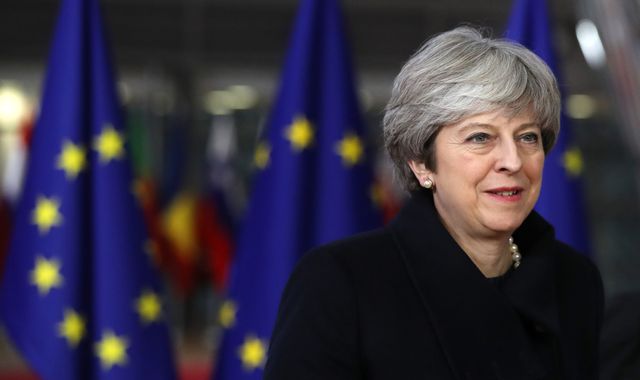EU warns Brexit deal by 2019 will be ‘dramatically difficult’ as talks move to next phase
Written by News on 15/12/2017
Agreeing a Brexit deal by the March 2019 deadline will be “dramatically difficult”, the European Union has warned.

The stark warning came from EU Council President Donald Tusk, who was speaking after European leaders agreed to move Britain’s exit negotiations onto the next phase.
“It is still realistic and of course dramatically difficult,” he said. “For sure, the second phase will be more demanding, more challenging than the first phase.”
:: Analysis: Theresa May’s Brexit challenge
:: What to expect from the next phase
:: Talks could be extended if MPs reject Brexit deal
:: Recap: EU approves talks entering phase two
Theresa May hailed the development as a key milestone which shows she is “well on the road” to “delivering the smooth and orderly Brexit that people voted for”.
But the Prime Minister is facing calls from Brussels for “further clarity” on what she wants Britain’s future relationship with Europe to be.
European leaders say “sufficient progress” has been made on the initial divorce issues – Britain’s exit bill, citizens’ rights and the Irish border.
The decision was announced by Mr Tusk following discussions lasting less than 30 minutes at a summit in Brussels.
He tweeted: “EU leaders agree to move on to the second phase of #Brexit talks. Congratulations PM @theresa_may.”
Mrs May left the two-day gathering early after earning a round of applause from EU leaders after assuring them of her determination to see Brexit through.
The PM triggered Article 50 – the formal process for severing ties with Brussels – in March. Under the terms of Article 50, Britain has two years to agree an exit deal with the EU.
Negotiators can now begin discussing the terms of the transition period next month, before turning their attention to the future trading relationship in March.
The EU’s position on the transition was confirmed on Friday – and Brussels’ stance has provoked anger among Brexit supporters.
Under guidelines released by the European Council and agreed by leaders of the 27 remaining member states, the UK will remain under the jurisdiction of the European Court of Justice and be required to allow freedom of movement during this period, which will last for two years.
Essentially, Britain will have to follow EU rules in their entirety during the period before Brexit takes full effect.
This would hamper the Government’s ability to agree free trade deals with nations around the world.
Conservative MP Jacob Rees-Mogg, a leading Brexiteer, told Sky News: “If the acquis, the ECJ and free movement remain we would not be in an implementation period but would still be de facto in the EU.”
He added: “I assume that Her Majesty’s Government will make its own proposals and not roll over in the way it did at the beginning of the process.”
Senior Conservative MP Crispin Blunt scoffed at the EU’s phase two guidelines, telling Sky News: “Normal bureaucratic charm. Ever wonder why we’re leaving?!”
Business groups have also put pressure on Mrs May, warning that further delays to talks on a post-Brexit trade deal could have “damaging consequences” and called for a transition to be agreed swiftly.
The PM has said she wants talks on post-Brexit trade to begin “straight away”, but the EU’s guidelines seem to dash hopes of quickly moving to substantive talks.
Brussels is at the moment only willing to participate in “preliminary and preparatory discussions with the aim of identifying an overall understanding of the framework for the future relationship” after additional guidelines have been adopted at a future summit in March.
The four-page document also says that a final agreement on the future trading relationship can only be signed off once Brexit has formally taken effect.
The obstacles that lie ahead in agreeing a deal on trade are hinted at as well, with the guidelines noting that Britain wants to leave the EU’s single market and customs union.
Because of this stance, the EU will be required to “calibrate” its approach on trade and economic co-operation to “ensure a balance of rights and obligations, preserve a level playing field, avoid upsetting existing relations with other third countries, and … preserve the integrity and proper functioning of the single market”.
The furore caused by Brexit Secretary David Davis’ statement that the phase one deal was a “statement of intent” rather than a legally watertight agreement is also addressed.
“Negotiations in the second phase can only progress as long as all commitments undertaken during the first phase are respected in full and translated faithfully into legal terms as quickly as possible,” the guidelines say.
(c) Sky News 2017: EU warns Brexit deal by 2019 will be ‘dramatically difficult’ as talks move to next phase






